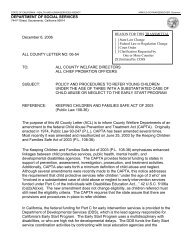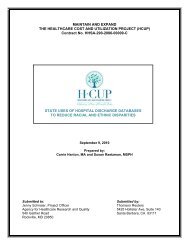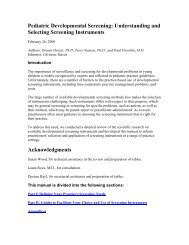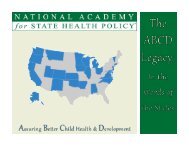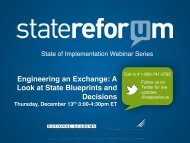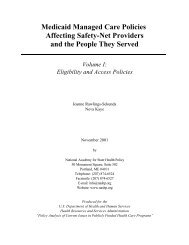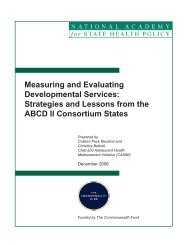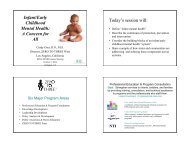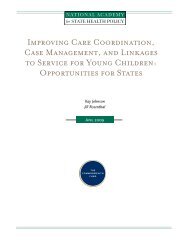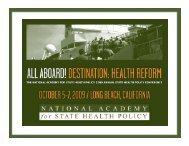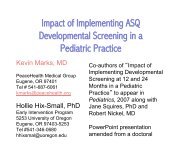Developing Federally Qualified Health Centers into Community ...
Developing Federally Qualified Health Centers into Community ...
Developing Federally Qualified Health Centers into Community ...
Create successful ePaper yourself
Turn your PDF publications into a flip-book with our unique Google optimized e-Paper software.
<strong>Health</strong> centers need to stop acting like a federal<br />
program dropped in the middle of a state.‖<br />
As illustrated by the experiences in<br />
Montana, North Carolina, and Indiana, FQHCs<br />
can play innovative roles in the development<br />
of community networks. However, there are a<br />
number of barriers that they will need to<br />
overcome if they are to assume such roles in<br />
their state health care delivery systems.<br />
CHALLENGES<br />
The mission of FQHCs is to provide primary and preventive services for the uninsured,<br />
underinsured, and underserved who walk through their doors. FQHC experts say that<br />
fulfilling this mission consumes a great deal of effort and resources. FQHCs may not<br />
want the burdens of new responsibilities—especially when the number of FQHC patients<br />
is expected to grow under health reform. The National Association of <strong>Community</strong> <strong>Health</strong><br />
<strong>Centers</strong> forecasts that FQHCs will serve 40 million patients in 2015, up from 19.4 million<br />
patients in 2010. 26<br />
Collaboration with other providers is a necessary part of community network<br />
roles, and may represent a new role for many FQHCs. This may change going forward,<br />
however. In the application guidelines for new FQHC sites, the <strong>Health</strong> Resources and<br />
Services Administration is asking applicants to show evidence of community<br />
collaboration and demonstrate their capacity to engage with hospitals, schools, public<br />
health departments, and other providers. 27<br />
Stakeholders identified several other barriers that may limit the development and<br />
spread of FQHC-based community networks that enable other providers to serve as<br />
medical homes.<br />
Congressional mandates. Federal law overseeing FQHCs limits a state’s ability to<br />
freely develop certain kinds of networks and may hinder collaboration.<br />
Different kinds of systems. Private providers do not typically share FQHCs<br />
mission to serve all patients, regardless of their ability to pay. It thus may be difficult for<br />
such providers to relate to FQHCs’ priorities and build affiliations with them.<br />
24<br />
<strong>Health</strong> centers<br />
need innovators and out-of-thebox<br />
thinkers. We were able to<br />
partner and pull this together<br />
without looking at a map. <strong>Health</strong><br />
centers need to stop acting like a<br />
federal program dropped in the<br />
middle of a state.<br />
Gaston Family <strong>Health</strong> Services CEO



